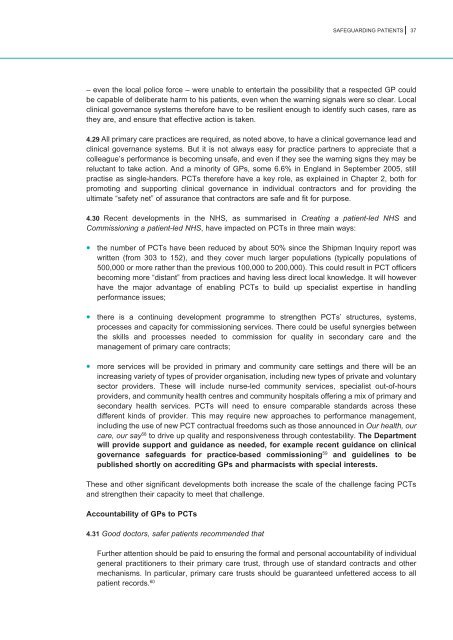Safeguarding
Safeguarding patients - BiP Solutions Ltd.
Safeguarding patients - BiP Solutions Ltd.
- No tags were found...
You also want an ePaper? Increase the reach of your titles
YUMPU automatically turns print PDFs into web optimized ePapers that Google loves.
<strong>Safeguarding</strong> Patients 37<br />
– even the local police force – were unable to entertain the possibility that a respected GP could<br />
be capable of deliberate harm to his patients, even when the warning signals were so clear. Local<br />
clinical governance systems therefore have to be resilient enough to identify such cases, rare as<br />
they are, and ensure that effective action is taken.<br />
4.29 All primary care practices are required, as noted above, to have a clinical governance lead and<br />
clinical governance systems. But it is not always easy for practice partners to appreciate that a<br />
colleague’s performance is becoming unsafe, and even if they see the warning signs they may be<br />
reluctant to take action. And a minority of GPs, some 6.6% in England in September 2005, still<br />
practise as single-handers. PCTs therefore have a key role, as explained in Chapter 2, both for<br />
promoting and supporting clinical governance in individual contractors and for providing the<br />
ultimate “safety net” of assurance that contractors are safe and fit for purpose.<br />
4.30 Recent developments in the NHS, as summarised in Creating a patient-led NHS and<br />
Commissioning a patient-led NHS, have impacted on PCTs in three main ways:<br />
• the number of PCTs have been reduced by about 50% since the Shipman Inquiry report was<br />
written (from 303 to 152), and they cover much larger populations (typically populations of<br />
500,000 or more rather than the previous 100,000 to 200,000). This could result in PCT officers<br />
becoming more “distant” from practices and having less direct local knowledge. It will however<br />
have the major advantage of enabling PCTs to build up specialist expertise in handling<br />
performance issues;<br />
• there is a continuing development programme to strengthen PCTs’ structures, systems,<br />
processes and capacity for commissioning services. There could be useful synergies between<br />
the skills and processes needed to commission for quality in secondary care and the<br />
management of primary care contracts;<br />
• more services will be provided in primary and community care settings and there will be an<br />
increasing variety of types of provider organisation, including new types of private and voluntary<br />
sector providers. These will include nurse-led community services, specialist out-of-hours<br />
providers, and community health centres and community hospitals offering a mix of primary and<br />
secondary health services. PCTs will need to ensure comparable standards across these<br />
different kinds of provider. This may require new approaches to performance management,<br />
including the use of new PCT contractual freedoms such as those announced in Our health, our<br />
care, our say 58 to drive up quality and responsiveness through contestability. The Department<br />
will provide support and guidance as needed, for example recent guidance on clinical<br />
governance safeguards for practice-based commissioning 59 and guidelines to be<br />
published shortly on accrediting GPs and pharmacists with special interests.<br />
These and other significant developments both increase the scale of the challenge facing PCTs<br />
and strengthen their capacity to meet that challenge.<br />
Accountability of GPs to PCTs<br />
4.31 Good doctors, safer patients recommended that<br />
Further attention should be paid to ensuring the formal and personal accountability of individual<br />
general practitioners to their primary care trust, through use of standard contracts and other<br />
mechanisms. In particular, primary care trusts should be guaranteed unfettered access to all<br />
patient records. 60


